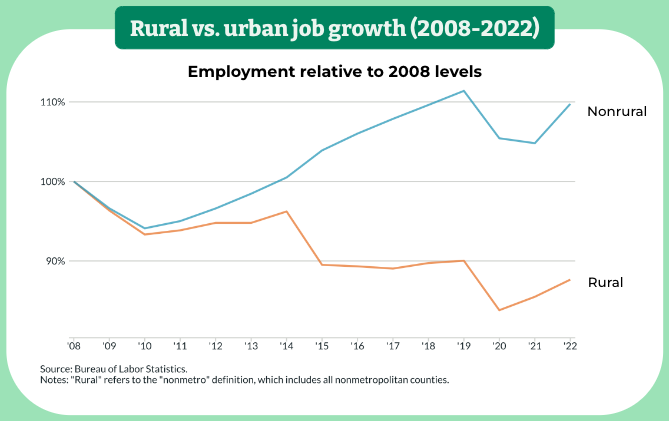The Definition of Rural

Our mission at the Center on Rural Innovation is to advance rural economies and close the rural opportunity gap.
To help center our work where it has the greatest potential to make sustainable change, here’s what CORI includes in our definition of rural:
- Communities within nonmetro counties. Generally these counties only have communities with fewer than 50,000 people and are not a suburb.
- Communities in a metro county that are isolated from the larger city in that county. These communities score 4 or higher on the USDA’s Rural Urban Commuting Area (RUCA) codes.
Communities with these characteristics are the ones that are affected the most by the growing economic opportunity gap between rural America and the rest of the country. These are the places where there are fewer jobs today than there were before the Great Recession, while employment in the rest of the country has more than recovered.
You can look up a community by this definition here.

CORI believes that there is incredible opportunity and talent in these rural places. Equity for rural places is at the heart of our work and we use this definition to invest a range of resources to help these communities meet their potential.
CORI uses this definition to guide our decisions about our core activities ranging from the communities we partner with to the companies we invest in to the people we hire.
How can I find out if my community or hometown is rural?
We recommend using the “Am I Rural” tool on the Rural Health Information Hub by clicking the button below:
For more information about the importance of rural definitions
Explore our previous work that examines rural America, how it is defined, and how it has been impacted by the recession opportunity gap.
-
Defining rural AmericaThe first story from our Rural Aperture Project explains the consequences of how we count who lives in rural America.
-
Who lives in rural America?The second story from our Rural Aperture Project, told in two parts, explores (1) how flawed conceptions of rural America have come to exist, and (2) the demographics of people who call rural America home.
-
Rural America’s tech employment landscapeThe report from our nearly year-long research effort reveals that there four central themes common across rural tech ecosystems when it comes to tech employment and training.